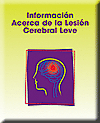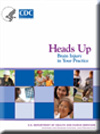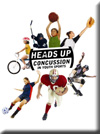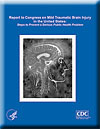|
 |
TBI Publications
This page contains a short description of each NCIPC publication about traumatic brain injury (TBI). These publications are available for ordering in hard copy, for viewing online, or for downloading. Some publications are out of print and are only available in electronic format.
 Facts about Concussion and Brain Injury and Where to Get Help Facts about Concussion and Brain Injury and Where to Get Help
A blow or jolt to the head can cause a mild TBI called a
concussion. This brochure explains what can happen after a concussion, how to get better, and where to go for more information and help when needed. |
|
 Information about Mild Brain Injuries (Información
Acerca de la Lesión Cerebral Leve) Information about Mild Brain Injuries (Información
Acerca de la Lesión Cerebral Leve)
This brochure is written for Spanish-speaking people with brain injuries and for their
family members or caregivers. The brochure provides information about
brain injury, symptoms of brain injury, tips for healing, and resources. Members of
the Hispanic community, composed of various ethnic origins and racial
backgrounds, were involved in the development, design, and translation of this
brochure. |
|
Heads Up: Brain Injury in Your Practice tool kit
CDC, in collaboration with numerous partners, has developed this tool kit for
physicians to improve clinical diagnosis and management of mild TBI. Physicians
can play a key role in helping to reduce the occurrence of mild TBI by educating
patients and the community about risks and how to prevent these injuries. |
|
 Heads Up: Concussion in High School Sports tool kit Heads Up: Concussion in High School Sports tool kit
Concussions can happen to any athlete—male or female—in any sport. Coaches, athletic directors, and trainers play a key role in preventing, recognizing, and managing concussion among athletes. CDC, with the support of multiple partners and experts, has developed a tool kit for coaches titled Heads Up: Concussion in High School Sports. The kit contains practical, easy-to-use information including a video and DVD, guide for coaches, wallet card, clipboard sticker, posters, fact sheets, and CD-ROM. |
|
 Heads Up: Concussion in Youth Sports tool kit Heads Up: Concussion in Youth Sports tool kit
To help ensure the health and safety of young athletes, CDC developed the “Heads Up: Concussion in Youth Sports” initiative to offer information about concussions to youth sports coaches, administrators, parents, and athletes. The “Heads Up” initiative provides important information on preventing, recognizing, and responding to a concussion. |
|

Help Seniors Live Better, Longer: Prevent Brain Injury
This initiative was developed for caregivers and children of older adults to raise their awareness of ways to prevent, recognize, and respond to fall-related traumatic brain injury among adults ages 75 and older. As part of this initiative, CDC developed English- and Spanish-language materials for older adults and their caregivers, including a brochure, booklet, fact sheet, magnet, posters, and e-cards. |
|

TBI in the US: Research and Programs of the CDC
The May–June 2005 issue of the Journal of Head Trauma Rehabilitation provides current information about TBI
research and programs funded by CDC. This special issue addresses a variety of TBI topics, including: public
health principles and legislation; surveillance and education; rates among children, older adults, and American
Indians/Alaska Natives; related outcomes, including death risk; and links to information and services for people
with TBI. |
|
 Report to Congress on Mild Traumatic Brain Injury in the United States: Steps to Prevent a Serious Public Health Problem Report to Congress on Mild Traumatic Brain Injury in the United States: Steps to Prevent a Serious Public Health Problem
CDC formed the Mild Traumatic Brain Injury (MTBI) Work Group, composed of experts in the field of brain injury, to determine appropriate and feasible
methods for assessing the incidence and prevalence of mild TBI in the United States. This report presents the significant findings and recommendations of the MTBI Work Group, which are the product of numerous discussions and a thorough review of the scientific literature. It describes the public health significance of mild TBI and recommends how to better measure the magnitude of the problem in this country.
|
|
 Traumatic Brain Injury in the United States: A Report to Congress, 1999 Traumatic Brain Injury in the United States: A Report to Congress, 1999
This federal report summarizes current knowledge about the incidence, causes, severity, associated disabilities,
and prevalence of TBI in the United States. It recommends public health goals that could
effectively prevent or reduce adverse outcomes from TBI
|
|
 Traumatic Brain Injury in the United States: Assessing Outcomes in Children Traumatic Brain Injury in the United States: Assessing Outcomes in Children
This report summarizes the comments, suggestions,
and recommendations of a working group convened by the Centers for Disease Control and Prevention (CDC) on the assessment of traumatic brain injury (TBI) outcomes in children and youth. It is intended for researchers, public health professionals—including those from state health departments—and advocates interested in furthering research on outcomes of TBI in children. |
|
 Traumatic Brain Injury in the United
States: Emergency
Department Visits, Hospitalizations, and Deaths Traumatic Brain Injury in the United
States: Emergency
Department Visits, Hospitalizations, and Deaths
This report provides detailed information about TBI-related deaths, hospitalizations, and emergency department visits in the United States for the years 1995 through 2001. These data can be used to address a wide range of important questions, such as how many TBIs
occur each year in the United States, who is affected, and how these TBIs occur. |
|
 Traumatic Brain Injury in the United States: The Future of
Registries and Data Systems Traumatic Brain Injury in the United States: The Future of
Registries and Data Systems
In 2002, CDC convened an expert panel to discuss the future of TBI registries and data systems, providing guidance for CDC to develop a national program. This report summarizes the expert panel’s recommendations, which include: funding more states to collect, analyze, and report TBI surveillance data; using existing national data sets to estimate the impact of TBI in the United States; and enhancing systems to identify and contact people with TBI and to connect them with needed services. |
|
